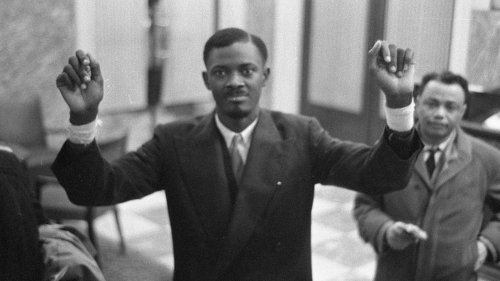
Harry Pot/Sundance Institute
MOVIE REVIEW
Soundtrack to a Coup d'Etat (2024)
Johan Grimonprez, the documentarian behind "Soundtrack to a Coup d'Etat," anticipates that his video essay will cause some controversy when it gets shown on the Belgian television networks that cofunded it. You might think it would cause some in the States and the corridors of the United Nations also, except that international involvement in the death of Congolese independence leader Patrice Lumumba in 1961 has been accepted and historicized since roughly the day after it happened, relitigated by radical activist art and mentioned in Oliver Stone films as an example of exactly the kind of things Oliver Stone films are about. Mr. Grimonprez analyzes the affair through a huge quantity of rigorously cited archive footage, interviews, academic literature and testimony. And jazz, since the film wraps the Congo Crisis inside the global anticolonial currents surging at the time, reflected in Black music and U.S. civil rights struggles as much as anywhere else. But it's the Belgian colonial powers that look worst in the harsh light that Mr. Grimonprez shines on them.
The musical lens gets pretty close to the subject. On top of the supportive sentiments and music of people like Nina Simone, Thelonious Monk and Max Roach who said his jazz was a weapon against man's inhumanity to man, Mr. Grimonprez also shows the bizarre situation that Louis Armstrong found himself in. Touring the newly independent Congo at the request of the States, Armstrong realized he had been sent as a smokescreen for the anti-Lumumba machinations of the C.I.A.; the trumpeter threatened to renounce his American citizenship and relocate to Ghana. Meanwhile the covert powers hustling Lumumba toward the grave were nefarious and wicked, with the usual added trait of incompetence. A situation update from one plotter to another says "Too many Lumumba killers already in place, no need to send more," like overstocking on soup. The most level-headed individual on the film's international stage is the U.S.S.R.'s Nikita Khrushchev, making two attempts at getting the U.N. to denounce colonialism wholesale and haranguing the West at length on behalf of African nations, even if his self-interest is hardly a mystery. Mr. Grimonprez puts images of Khrushchev banging his shoe on a U.N. desk against shots of toe-tapping footwear worn by a jazz audience, which is the kind of visual alignment you can set up in a video-essay like this one.
Mr. Grimonprez's methods aren't really like those of Adam Curtis, whose video essays enjoy wandering into esoteric states of mind and running for a week; but sometimes the same sense of dark fate that Mr. Curtis works with appears here. The Congo was the source of 3,000 tons of uranium that went into the American atomic bomb project, with 1,500 tons of the stuff still there when the C.I.A. started plotting, for anyone who might have fancied seeing what they could do with it. At various points the violence is subcontracted out to groups of mercenaries, one of them including a young "Mad Mike" Hoare, later an ambivalent figure on the British media landscape as the U.K. tried to work out exactly how guilty it should feel about what went on in the colonies.
As always in all these dark, murderous, covert histories, the English language buckles under the strain of trying to talk about what it's talking about. Belgian diplomat and shadowy player Frédéric Vandewalle, asked whether Lumumba was still alive after being shot, says the independence leader was "Not necessarily in a state of dying." An unnamed mercenary, one of those dropping American bombs from American planes onto Africans, tells a BBC interviewer that his job was to shoot at everyone, destroy them and burn down their villages. Was he unhappy with these orders? "No," comes the reply. "It was a great life. No regular hours, nice weather. . ."
Comments